Gold is a divisive colour for a car.
Most dismiss it as ostentatious and flashy, but it can look fantastic on a classic Ferrari GT or a Lamborghini Miura.
A gold Bentley, however, sounds as overtly grandiose as Versace catwalk couture or a Rolex Zenith, but one famous car for me breaks the rule.
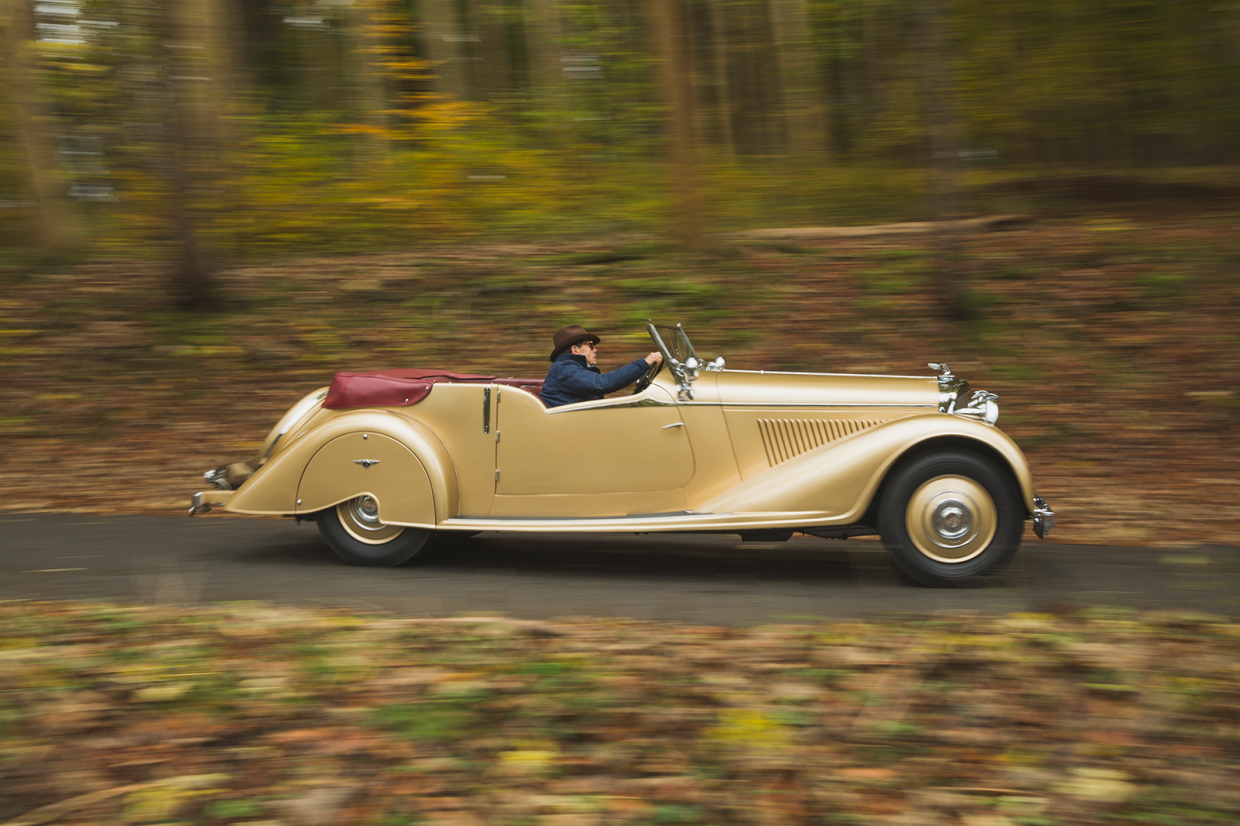 You can’t miss this dazzling Bentley with its golden Valspar paint
You can’t miss this dazzling Bentley with its golden Valspar paint
Christened Honeysuckle after its bold hue, chosen in 1939 by a famous British fashion designer, this long-cherished late-model Derby 4¼-litre is no cosseted classic.
The odometer has been round several times over the past eight decades, with the majority driven by a hugely respected marque connoisseur and historian.
No season matches Honeysuckle’s colour scheme like the autumn, and even on a misty morning it glows like a ginkgo tree in a shaded wood.
 This car’s first owner was Captain Edward Henry Molyneux
This car’s first owner was Captain Edward Henry Molyneux
Various European coachbuilders created more exotic lines on the Derby, including Vanvooren and Vesters & Neirinck, but for me the last, much-copied Vanden Plas Sports Tourer body fitted to chassis B154MR is the most desirable.
With its top down, the low windscreen and unique extended rear bumper give this classic English design extra presence, further enhanced by the unusual colour.
At night, just before WW2, with five lights cutting the darkness and the smooth ‘six’ whistling through London’s West End, this golden wonder must have created a tremendous stir.
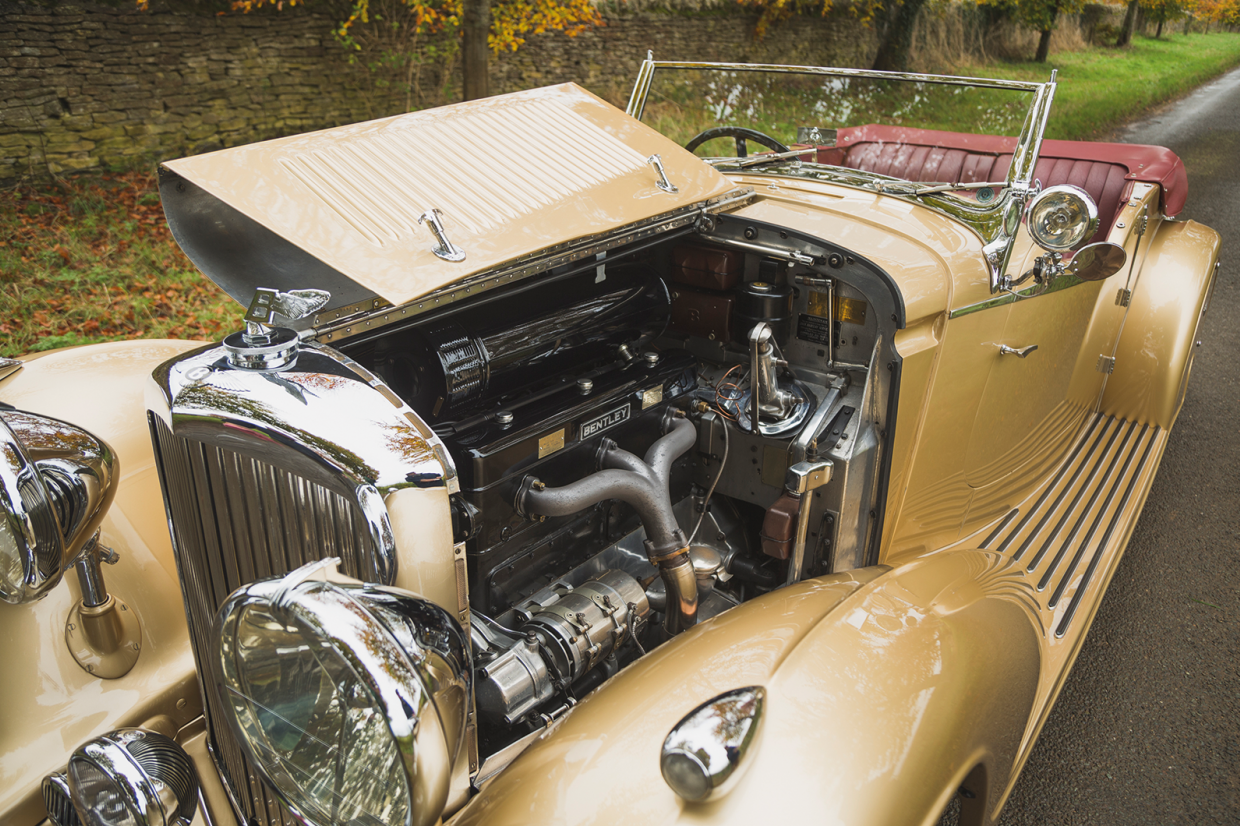 The Bentley’s 4527cc ‘six’ makes 125bhp
The Bentley’s 4527cc ‘six’ makes 125bhp
The last of the Derby Bentley, or ‘Rolls Bentley’ as the line is also called, is the finest thanks to its uprated 4527cc engine, plus improved gearbox and Marles steering.
Just six highly desirable Vanden Plas tourers were offered on the final MR and MX chassis with the ultimate overdrive option, all of which were launched at the 1938 Earls Court Motor Show with a £1430 price-tag and discreetly identified by a new, sleeker ‘Flying B’ mascot.
The roads for my lucky run in Honeysuckle are deserted, and once behind the broad, three-spoke steering wheel of this mint machine, it’s easy to slip back to that final year of pre-war peace.
 Chassis B154MR wears a sleek Vanden Plas Sports Tourer body
Chassis B154MR wears a sleek Vanden Plas Sports Tourer body
A well-maintained Derby is a joy to drive, with refinement to match that of any 1930s tourer.
The controls have a Royce quality that WO himself preferred over his Cricklewood heavyweights.
The helm is smooth, and the gearchange, via the right-mounted floor lever, has a beautiful action.
With the refined torque of the hushed, high-camshaft 125bhp pushrod straight-six, however, changing gear is rarely required, as pre-war magazine testers reported enthusiastically.
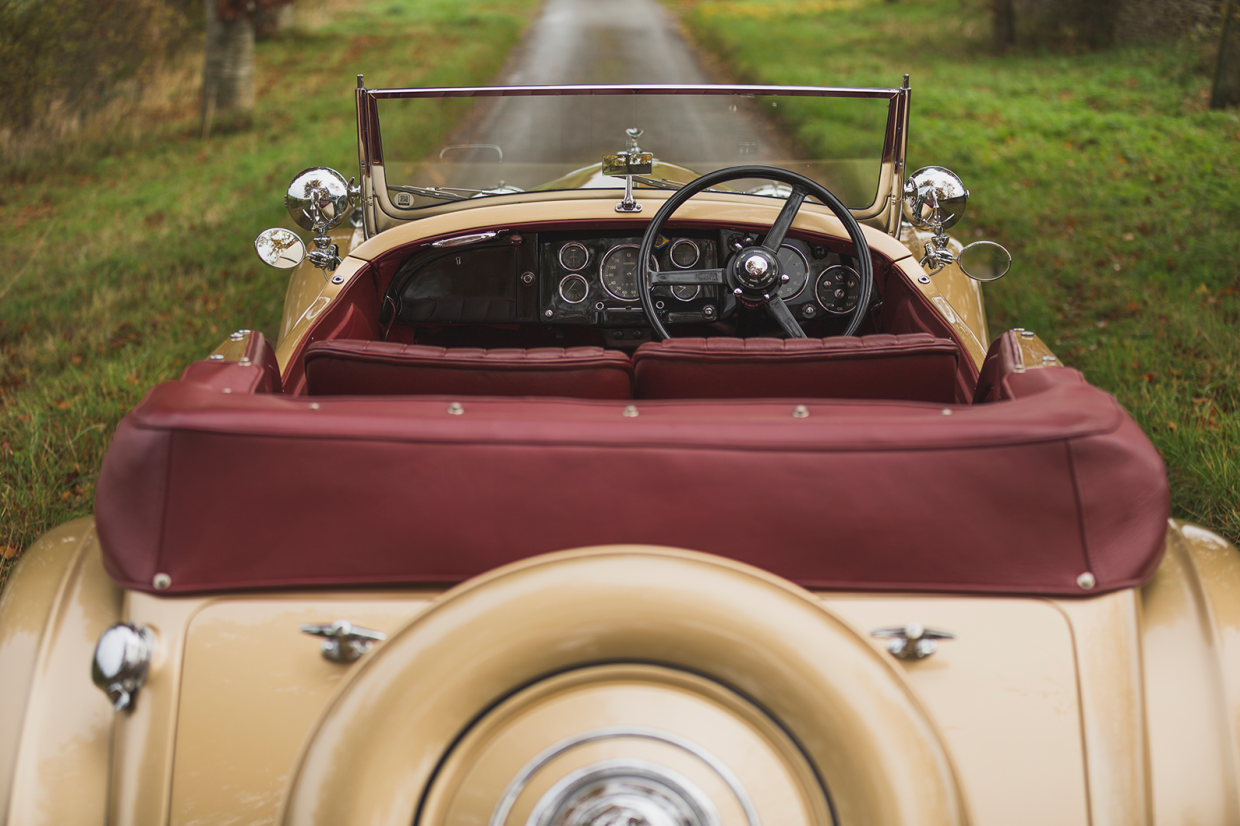 There is space for four in this well-travelled Bentley
There is space for four in this well-travelled Bentley
The ride, even on its smaller 17in wheels, is superb, thanks to the Royce hydraulic shock absorbers, and although it was never a sports car, this 1500kg tourer handles impressively once you’re tuned in to the light, high-geared cam-and-roller steering.
It’s easy to appreciate why speed legends such as Sir Malcolm Campbell, George Eyston, Prince Bira and Raymond Mays were all Derby Bentley drivers when travelling between events.
It’s confusing, but when first owner Captain Edward Henry Molyneux ordered his new 4¼-litre model in 1938, he specified Thrupp & Maberly Sedanca Coupé bodywork for chassis B154MR.
Mysteriously, Molyneux ordered a second overdrive chassis, B35MX, and had the body transferred. The bodyless frame of B154MR was then dispatched to Vanden Plas to have a stylish open tourer body fitted.
 Vanden Plas tourers were marked out by a new, sleeker ‘Flying B’ mascot
Vanden Plas tourers were marked out by a new, sleeker ‘Flying B’ mascot
No doubt to Molyneux’s specific instructions, the sporting coachwork was dramatically finished in golden Valspar paint with red leather trim.
After a distinguished military career in WW1, Molyneux had channelled his artistic talent in the fashion world and established a reputation for supremely elegant designs that tempted English aristocrats and film stars, including Lady Diana Cooper and Gloria Swanson.
His adage that “your tailor must make a suit that does something for you, and a woman’s dress should do even more” could have applied to the seductive lines of Honeysuckle.
Many bodies fitted to the Derby range were conservatively formal, but the sleek Vanden Plas tourer perfectly matched his stylish portfolio.
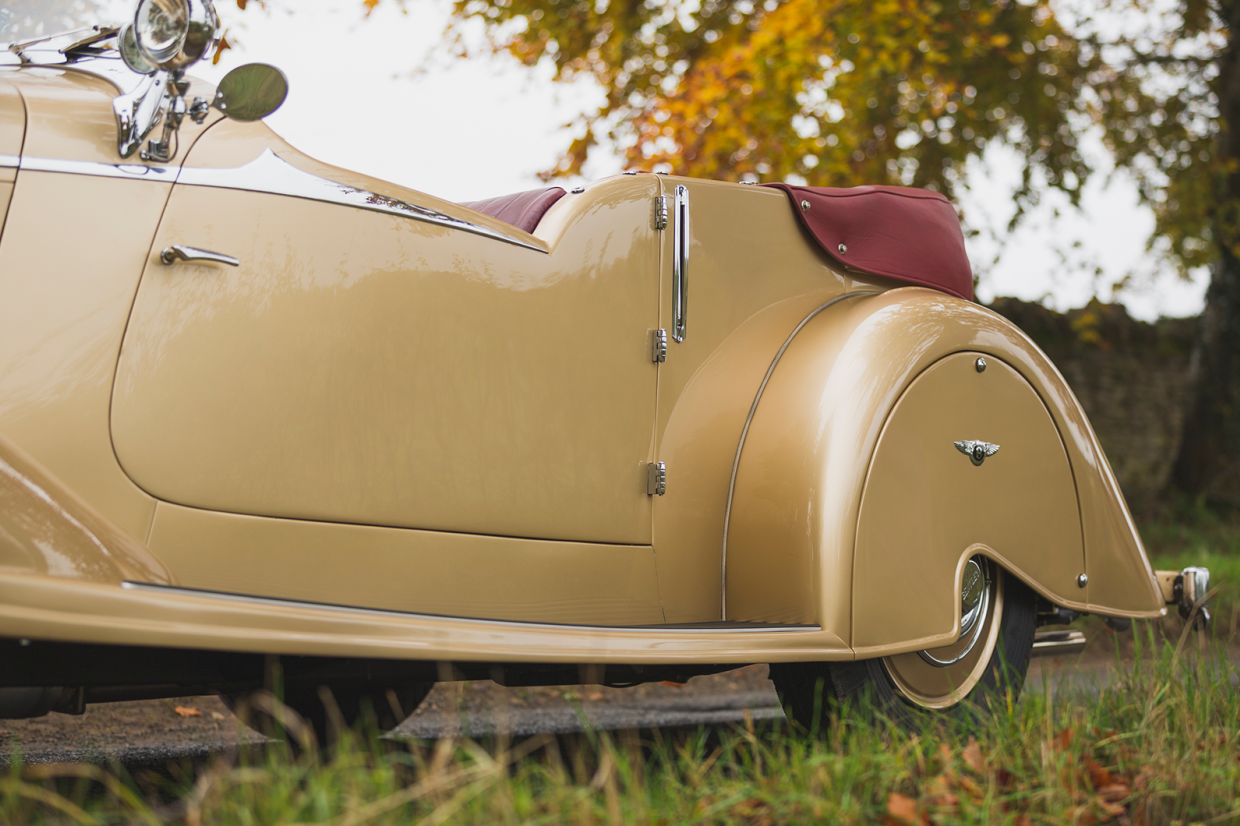 Elegant covered rear wheels add to the streamlined look
Elegant covered rear wheels add to the streamlined look
The order was made in June 1939 and finished on 17 August, but the couturier had other things on his mind after Germany’s invasion of Poland.
Coincidentally, the manager of Molyneux’s Paris store was highly decorated Special Operations Executive agent Forest Yeo-Thomas.
How much Molyneux drove Honeysuckle isn’t known because he was based in Paris until June 1940, when he escaped on a coal barge across the Channel back to London.
Bentley factory records list that B154MR was taken into stock as a ‘secondhand car’ in 1940 and sold to Mrs Jean Smith-Bingham.
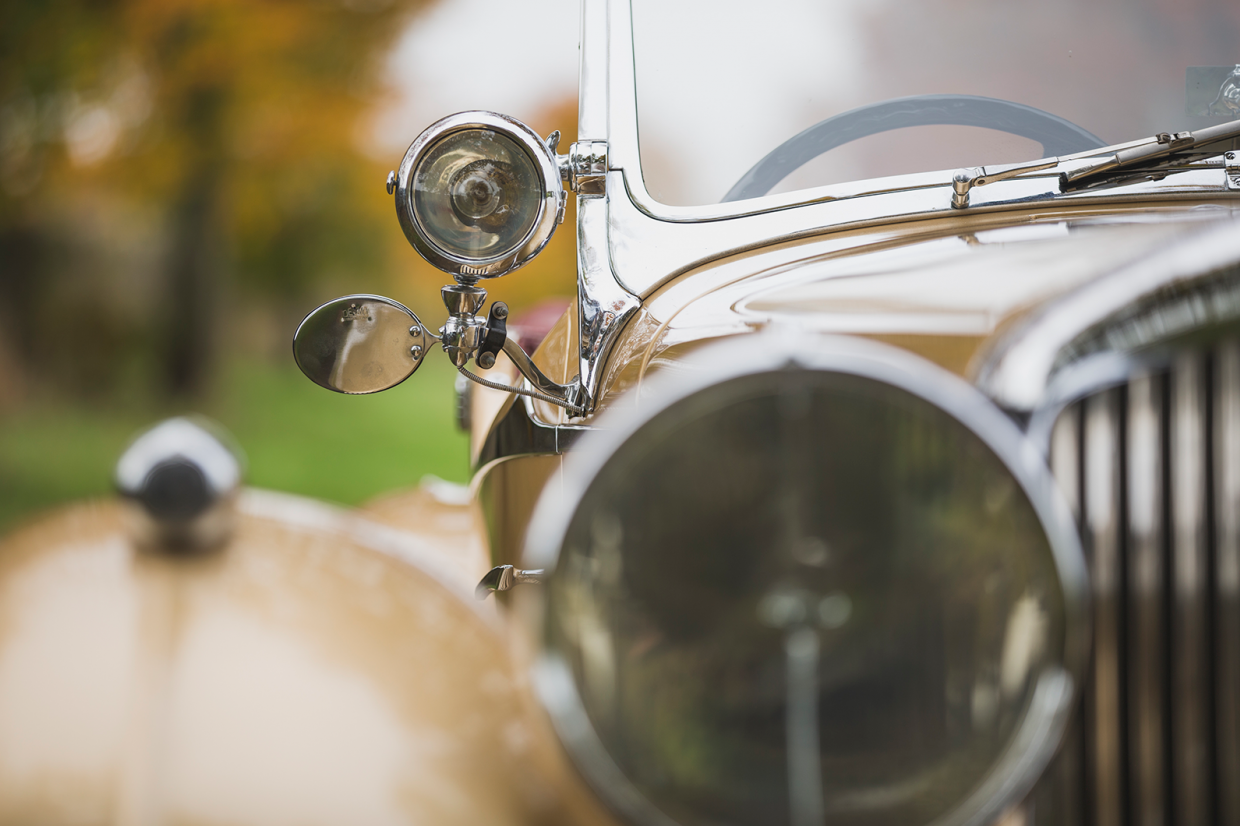 “At night, just before WW2, with five lights cutting the darkness and the smooth ‘six’ whistling through London’s West End, this golden wonder must have created a tremendous stir”
“At night, just before WW2, with five lights cutting the darkness and the smooth ‘six’ whistling through London’s West End, this golden wonder must have created a tremendous stir”
Indulged by her husband through the 1930s, she enjoyed a prosperous lifestyle with a succession of Derby Bentleys and a stable of thoroughbred racehorses.
As a director of HR Owen, Arthur Turberville Smith-Bingham always had first option on the latest Derby Bentley models, and through the factory he would have been one of the first to learn the newly finished Honeysuckle was on the market.
Maybe it was a gift to his wife to placate their reportedly rocky marriage.
It’s easy to imagine the gold tourer motoring out of their home at Wykham Park in Oxfordshire to visit various stables as the war clouds loomed.
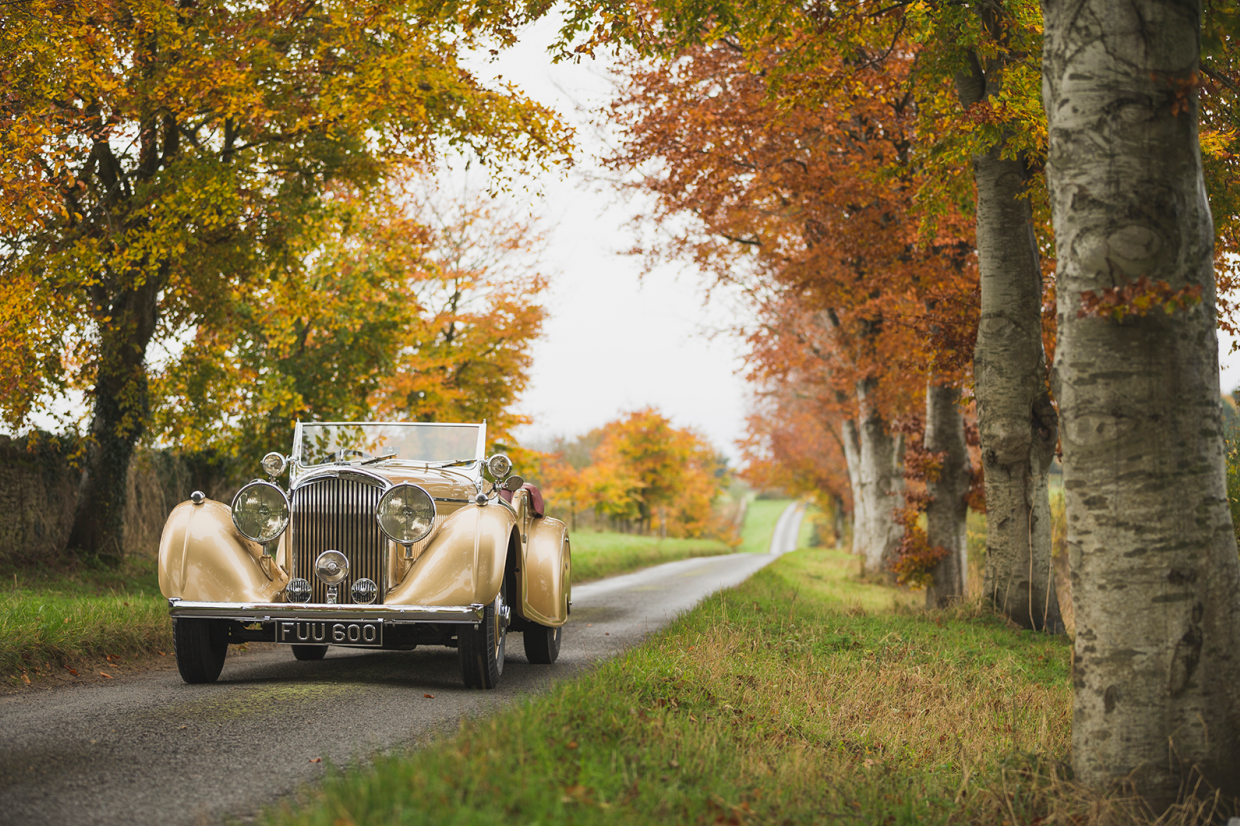 Even a Bentley as striking as this was not an easy car to sell in wartime
Even a Bentley as striking as this was not an easy car to sell in wartime
The Smith-Binghams’ stallion, Brendan’s Cottage, had won the Cheltenham Gold Cup in 1939, but by 1940 they’d filed for divorce and B154MR was back on the market with HR Owen.
Priced at £1350, it must have looked spectacular sitting in its West End showroom on Berkeley Street during those uneasy times. The London dealer invited The Autocar to test the low-mileage beauty for its Talking of Sports Cars series.
Not surprisingly, sales were slow during wartime but the tourer was eventually sold through agent Jack Barclay in February 1941 to Richard Dutton-Forshaw, based in Anglesey.
The Welsh island was home to another famous Vanden Plas-bodied Bentley, the ‘boy-racer’ 8 Litre owned by Captain Vivian Hewitt. I wonder if these two great cars ever met on one of Anglesey’s narrow country roads?
 Subtle luxury inside this Bentley
Subtle luxury inside this Bentley
Dutton-Forshaw kept Honeysuckle through the war but sold it in 1948 to David Bloomer, a Grimsby-based motor dealer.
The glamorous Bentley clearly proved a challenge to shift in the Lincolnshire fishing port, and Bloomer eventually traded it with Jack Barclay for a more restrained 4¼-litre with Brougham de Ville bodywork by James Young.
The London agent already had a buyer in mind, actor Hugh Sinclair, who had made his name during the war years playing ‘The Saint’ in two films, The Saint’s Vacation and The Saint Meets the Tiger.
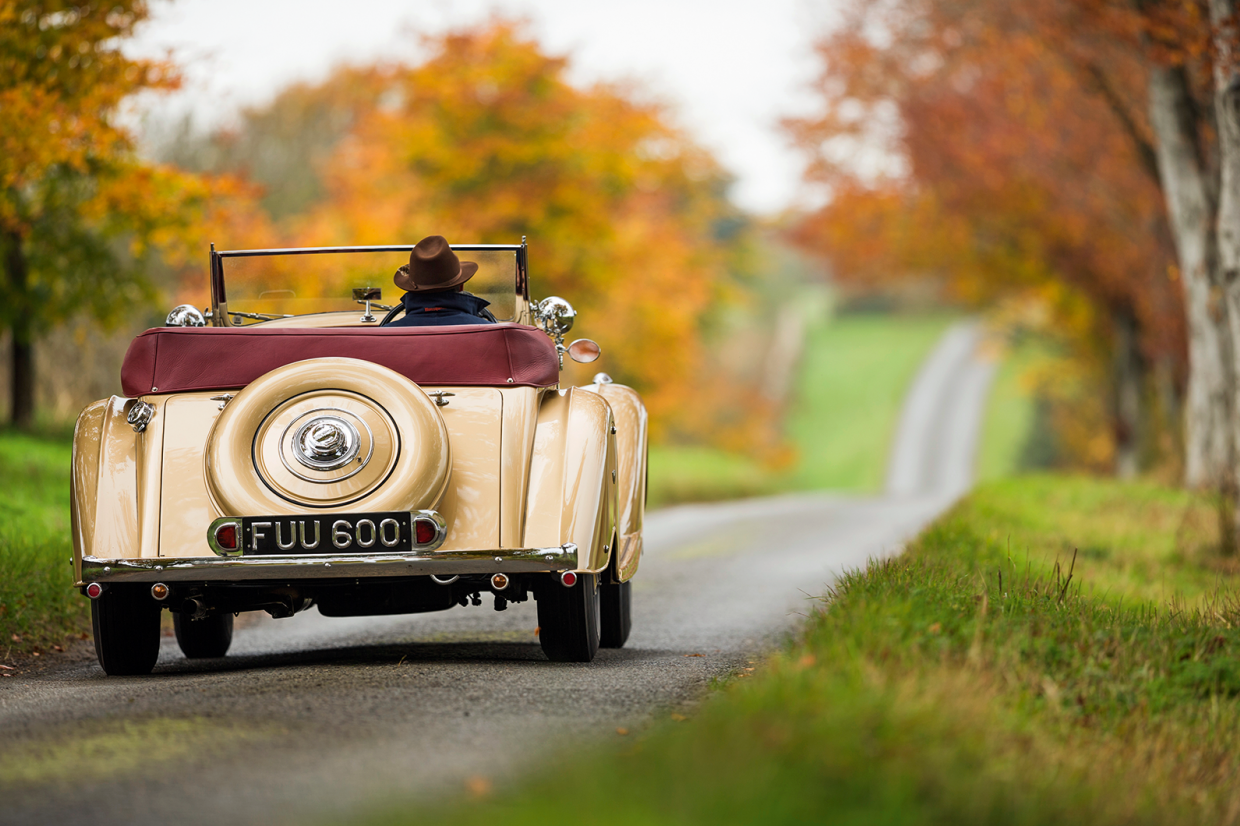 “The helm is smooth, and the gearchange, via the right-mounted floor lever, has a beautiful action”
“The helm is smooth, and the gearchange, via the right-mounted floor lever, has a beautiful action”
Sinclair only kept Honeysuckle for the summer before it was sold to William Riley, the owner of Soho & Vesta Glassworks in Birmingham.
The Derby joined his Bentley and Rolls-Royce hoard in the late 1940s, with Riley convinced that values would rocket with peacetime, and eventually the tourer moved to John Walsh, a department store owner in Sheffield.
Just two years later the 12-year-old Bentley had tempted the Hon William Douglas-Home, the dramatist and politician who at 39 had decided he needed a stylish open sports car – but the arrival of a first son just before Christmas 1952 meant that his ownership would be short-lived.
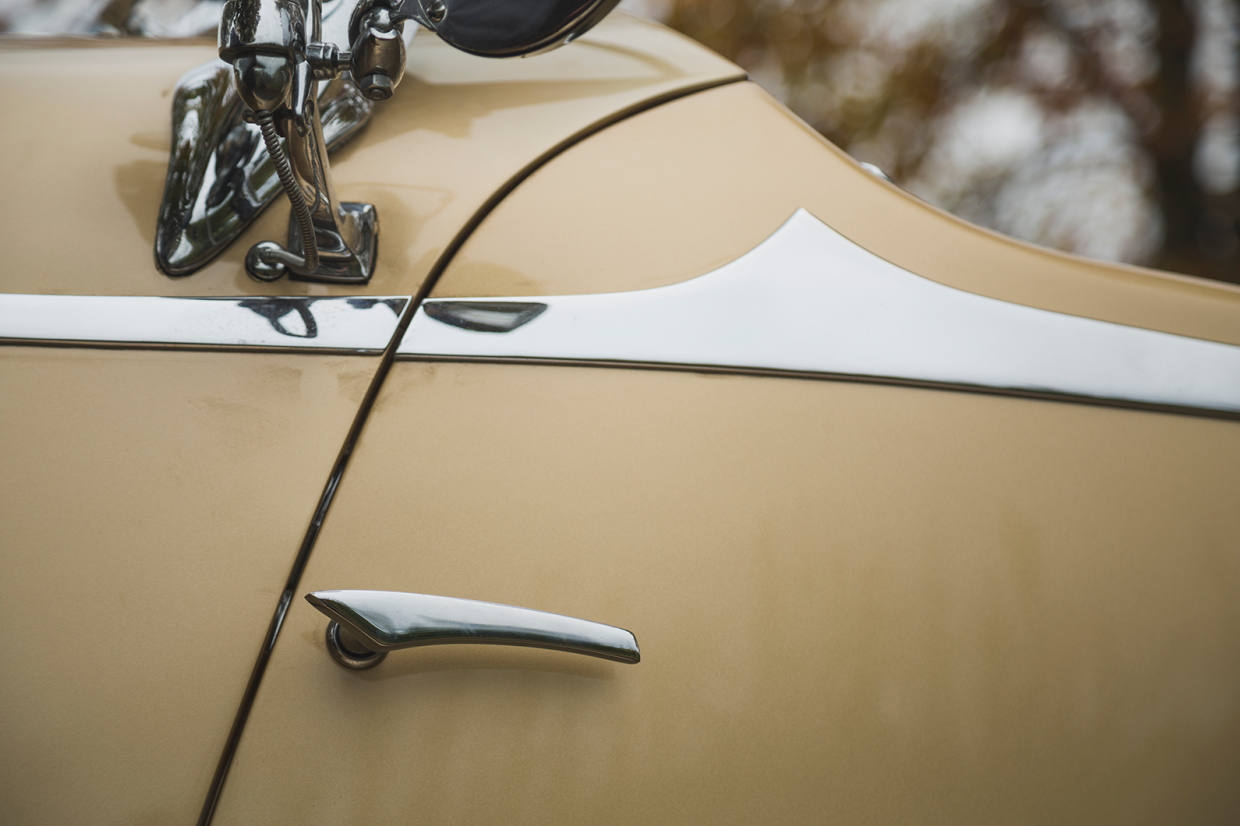 The colour manages to be eye-catching without being over the top
The colour manages to be eye-catching without being over the top
By chance, ardent enthusiast Johnnie Green was looking for a more comfortable replacement for his adored vintage 3 Litre, to transport his elderly parents around Europe.
His preferred choice was an 8 Litre but, although smitten by its near-silent engine and enormous, effortless power, Green felt that the 13ft wheelbase wasn’t practical.
The only option was a Derby, and on the advice of friends Green concluded that the 3 Litre’s replacement had to be an overdrive 4¼ with lightweight coachwork.
Just six cars fitted that specification, but a tip-off from John Cochrane at Jack Barclay led to an approach to Green’s old school chum Douglas-Home, the brother of the future prime minister.
 This classic Bentley has toured across the UK, US and Europe
This classic Bentley has toured across the UK, US and Europe
Happily, the new father had put his 4¼ up for sale because “nanny said an open Bentley was no motor for a wee bairn to go travelling to Scotland in”.
After an enjoyable lunch a deal was done for Honeysuckle – as Douglas-Home christened the light-gold Vanden Plas Derby, which perfectly matched Green’s requirements.
The following evening Green drove his new acquisition to Kings Cross so Douglas-Home could catch the ‘Night Scot’ back to Edinburgh, and so began ‘the most wonderful’ three decades of ownership.
‘Those happy journeys covering some two hundred thousand miles will live with me always,’ wrote Green in the Bentley Drivers Club Review.
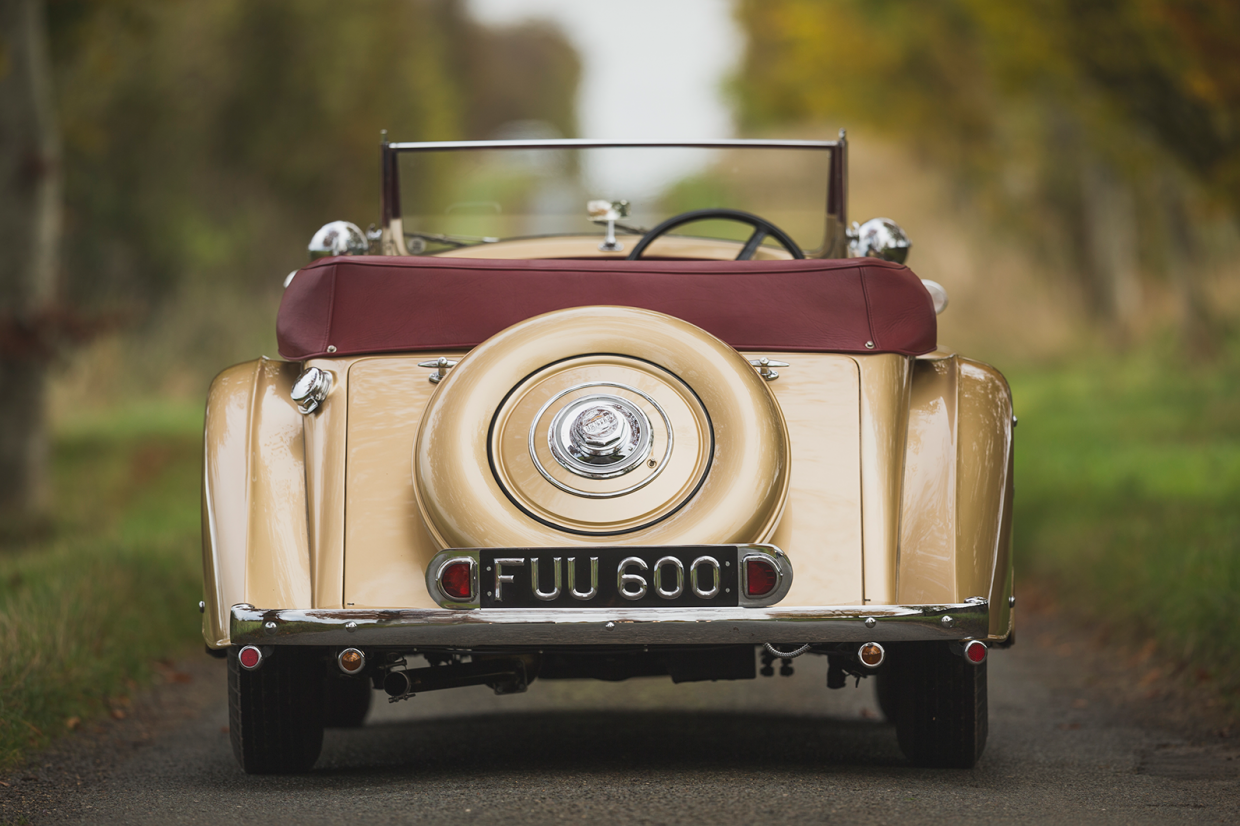 Perhaps unsurprisingly, concours success also features in this Bentley’s history
Perhaps unsurprisingly, concours success also features in this Bentley’s history
Parting with his 3 Litre ‘Greenfly’ was a wrench, but the sale to Pennsylvania introduced Green to new American friends and led to an ambitious tour of the USA in Honeysuckle.
Upon Green’s acquisition the 4¼-litre’s mileage was recorded at 70,000, and he spent the first six months of ownership getting the car up to his fastidious standards.
Green did much of the work, but for the chassis overhaul he enlisted specialist ‘Mac’ McKenzie.
The car was always immaculately presented and a regular at BDC concours events, including at Kensington Gardens, which Green organised.
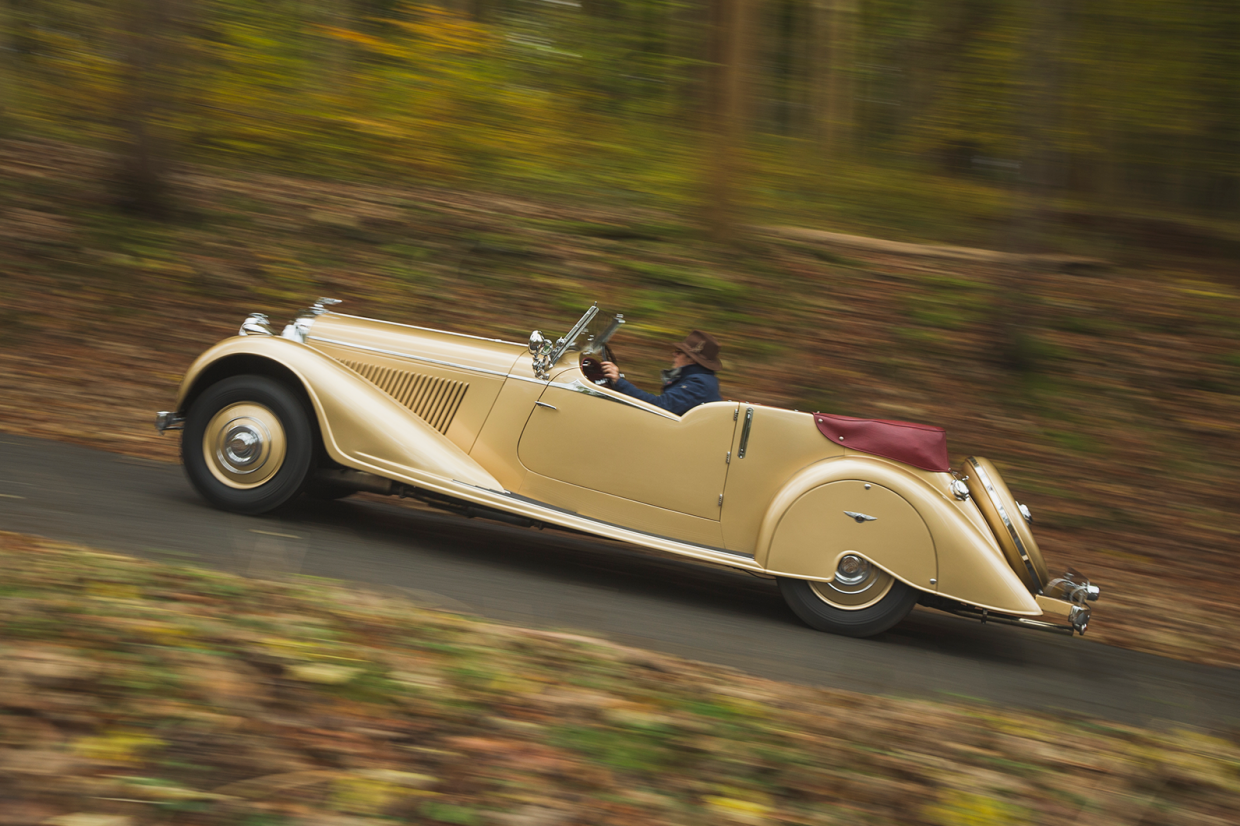 Even with these 17in wheels, the Bentley rides extremely well
Even with these 17in wheels, the Bentley rides extremely well
Honeysuckle was superbly maintained by Somerton Motors in Daleham Mews, Hampstead, and consistently took class wins including the BDC Overall Champion title in 1967 and the WAL Cook Trophy for best-maintained Derby Bentley.
At the 1968 British Grand Prix, Green and Honeysuckle were invited for the pre-race circuit tour, with Piers Courage riding in the passenger seat around Silverstone.
Green loved driving his Bentleys more than anything, and Honeysuckle was used for many memorable trips around Britain and Europe.
Highlights included the BDC’s Eastbourne Rally and a road-rally challenge with the local police team.
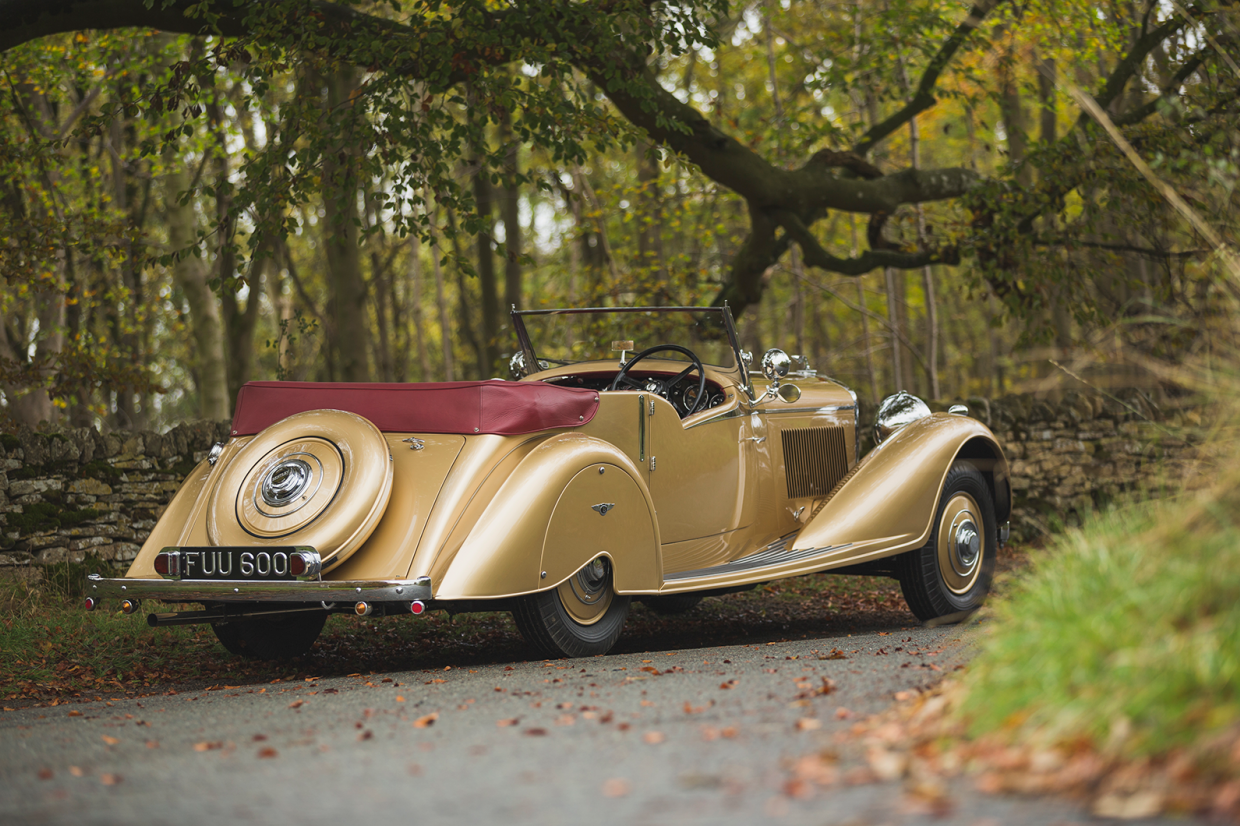 This Bentley has hydraulic shock absorbers that help its ride and handling
This Bentley has hydraulic shock absorbers that help its ride and handling
Green’s most ambitious road trip in the Derby was that tour across America in the late ’50s.
The car was shipped to New York and, after a tense few days waiting for Honeysuckle to be released from the docks, the long journey began with a route that included visits to car museums and collectors.
The sight of Green driving the gold Bentley into Detroit surrounded by finned cruisers and towering Peterbilt trucks en route to the Henry Ford Museum in Greenfield Village must have distracted local motorists.
When Green got lost, one Detroit citizen went miles out of his way to get the visitor back on course. Other highlights included a trip to Hershey and a concours in Morristown. Because most entrants had arrived by trailer, Green easily won the award for the furthest travelled.
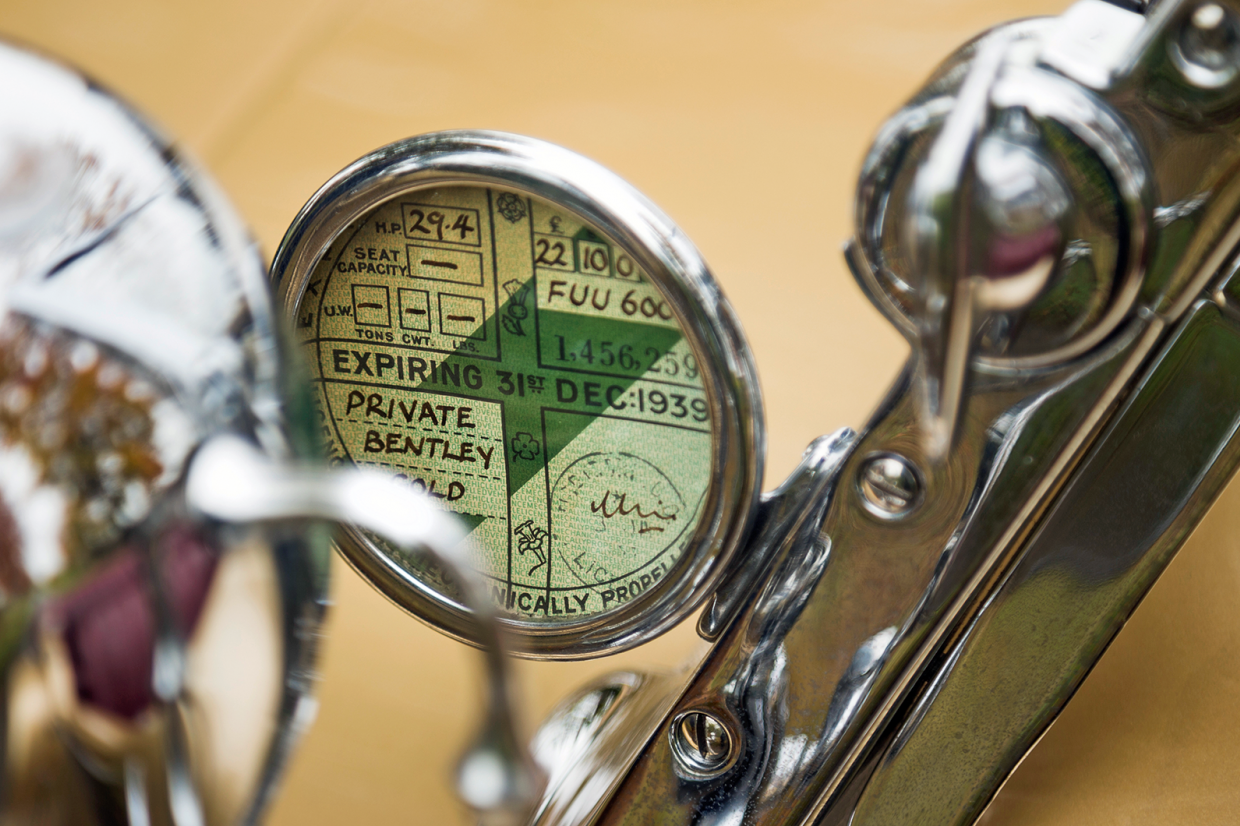 This Bentley’s history is very well documented
This Bentley’s history is very well documented
In later years Green ventured to Canada, where a spectacular thunderstorm flooded the roads and damaged the car’s exhaust system.
Miles from civilisation, Green motored noisily on until he spotted a small roadside garage. When the mechanics concluded he’d have to transport the Bentley to Chicago for repair, Green set about fixing it himself.
Taking a pair of tinsnips from his toolkit, he cut up an oil drum, and, with some extra-large Jubilee clips, fashioned a temporary repair.
The fix lasted throughout the holiday and many subsequent adventures, including a run to the island of Elba.
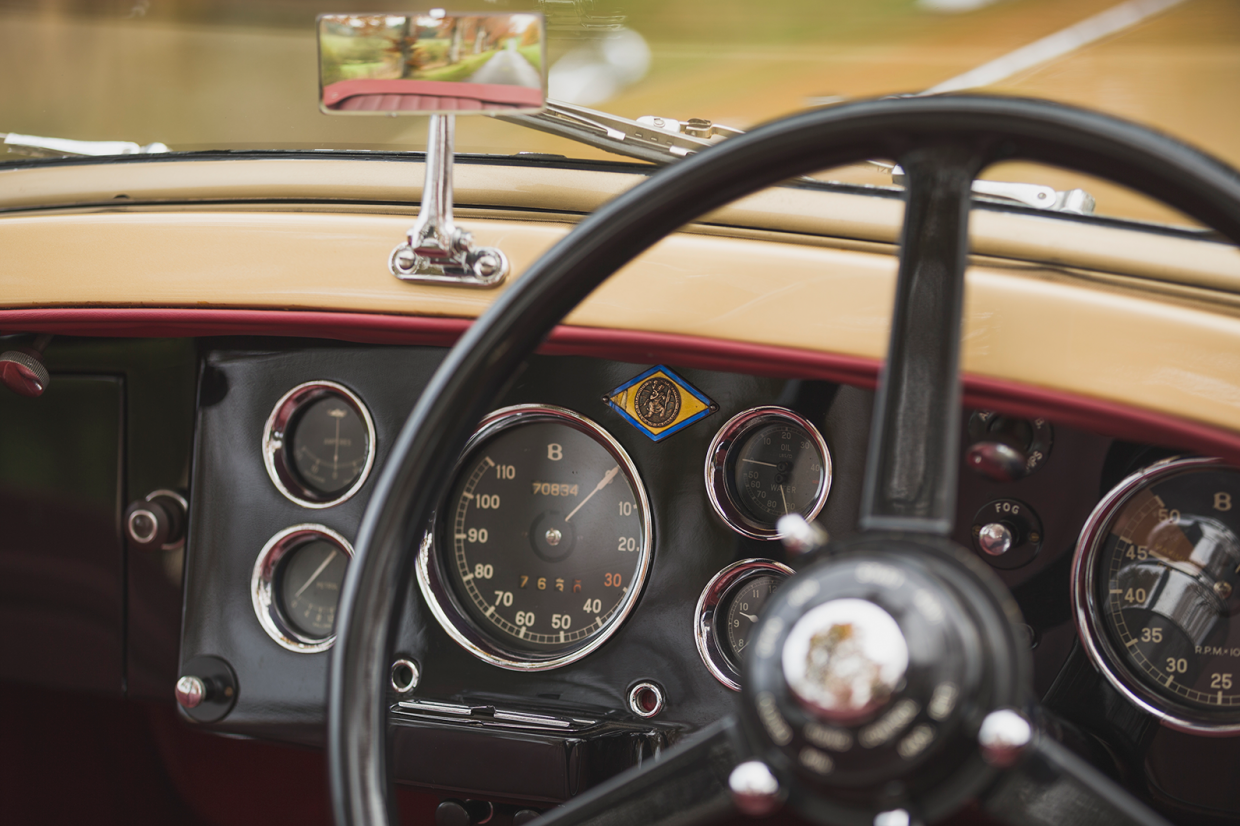 This classic Bentley has travelled more than twice round the clock
This classic Bentley has travelled more than twice round the clock
When the UK held its Common Market referendum in 1975, Green and Honeysuckle joined a 200-strong convoy of pre-war cars to Brussels as part of the Drive into Europe campaign to safeguard motorists’ rights.
After 33 years of ownership, and going twice around the clock, Green got the chance to buy “an utterly original 4½ Litre Vanden Plas tourer”.
Aged 70-plus, he liked the idea of his last Bentley choice going full circle. Honeysuckle was sold to dealer Charles Howard, who kept it for 10 years before selling it to the Blackhawk Collection in California where, in the Eagle Nest Place museum, it kept company with some of the world’s most spectacular cars.
Three years later Honeysuckle was on the seas again, heading back to England after acquisition by Derby Bentley aficionado Anthony Moody.
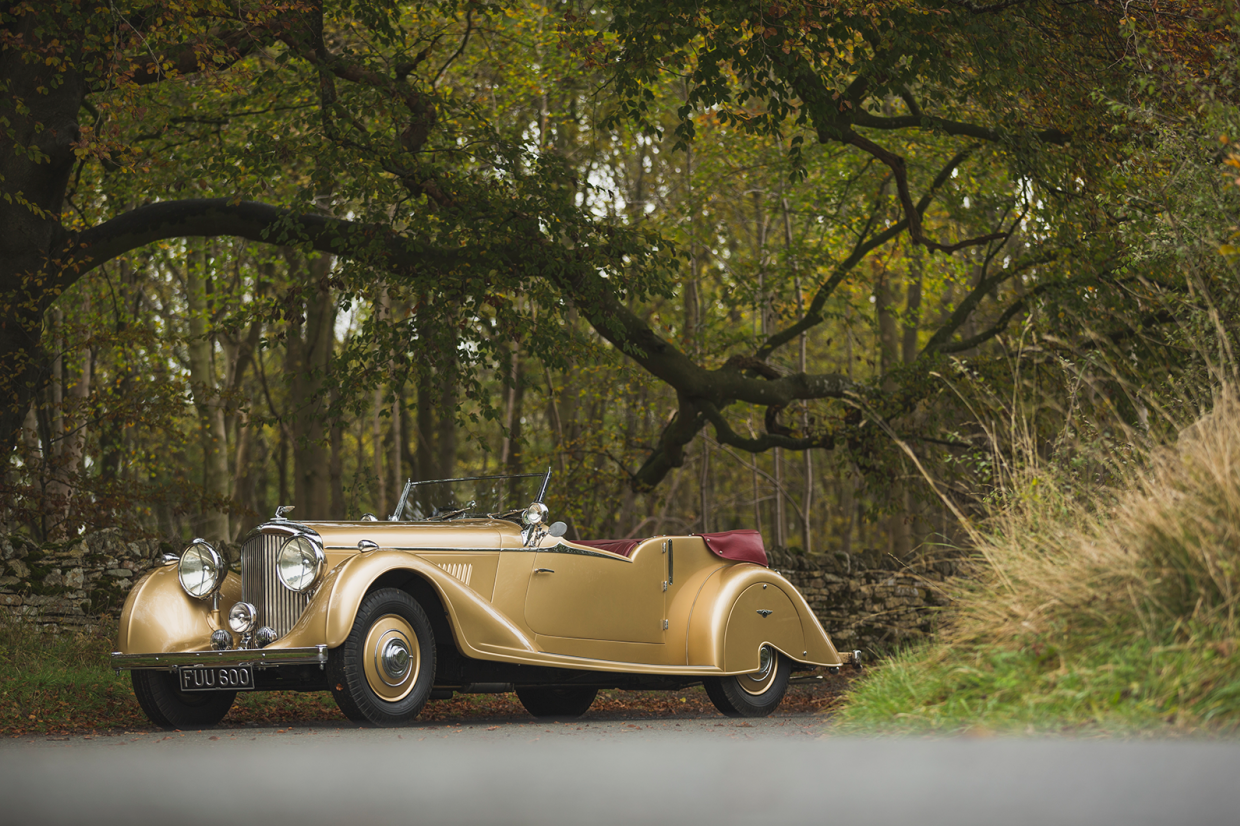 This car’s unique extended rear bumper helps to elongate its shape yet further
This car’s unique extended rear bumper helps to elongate its shape yet further
When invited to a prestigious Paris concours, there was no option but for Moody – who was fully aware of Green’s epic tours – to drive Chèvrefeuille from London to Paris.
The famous Bentley with three friends aboard surprised a few modern drivers as it cruised past on the autoroute at 85mph in overdrive at a relaxed 2500rpm.
After cleaning the car early on Saturday morning outside the hotel, Moody motored down the Champs-Élysées, around the Arc de Triomphe and into the Bois de Boulogne.
After the event, Moody began an idyllic tour of the Loire valley, covering 1300 miles in eight days before a fast run back to Warwickshire.

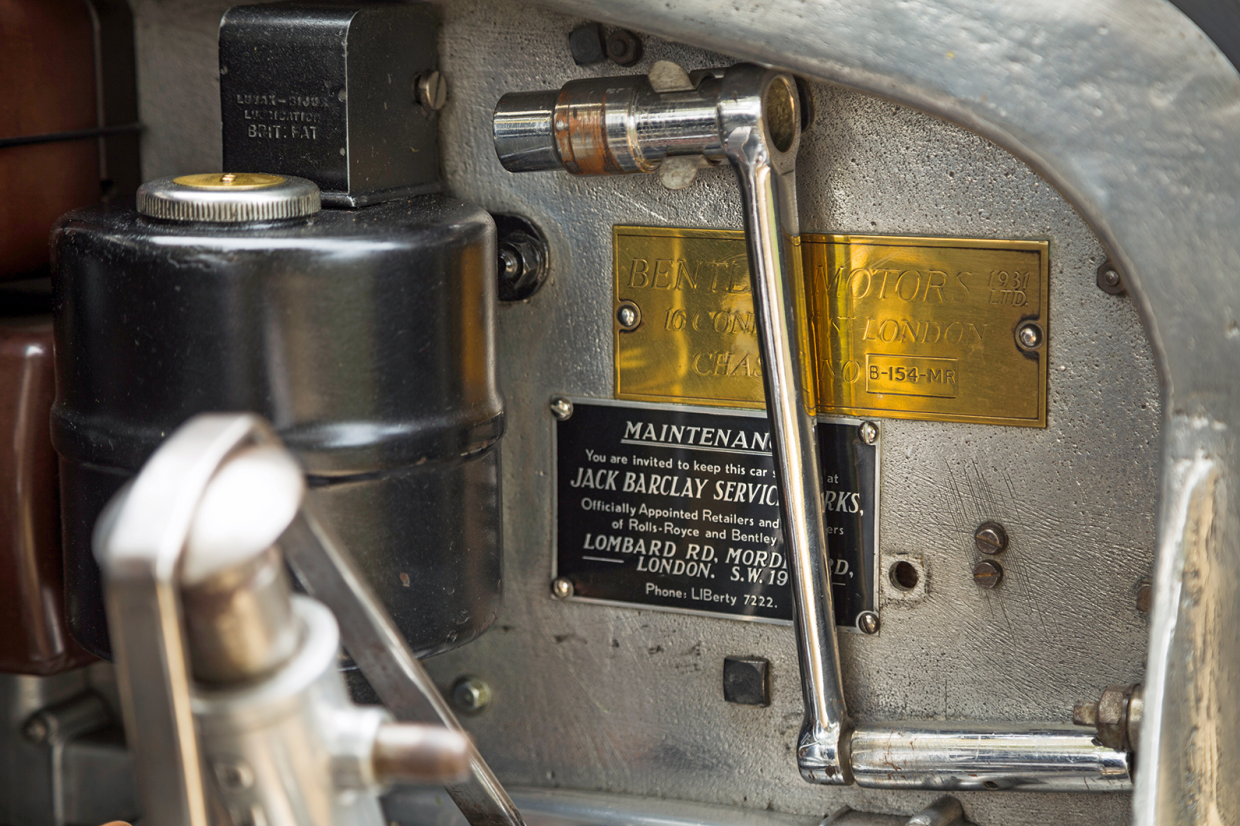 This stylish Bentley has always been carefully cared for
This stylish Bentley has always been carefully cared for
Making the perfect Derby Bentley pair, Honeysuckle kept company in Moody’s collection with the 4¼-litre Gurney Nutting Drophead that James Bond drove in the 007 classic Never Say Never Again.
In recent years, Honeysuckle has been back to America for the remarkable 2019 Bentley Centennial display at Pebble Beach.
On the pre-event Tour down Highway One its signature paint looked luminous as it purred along the Pacific coast. Green would no doubt have approved, and I hope lucky future owners continue his driving philosophy with B154MR.
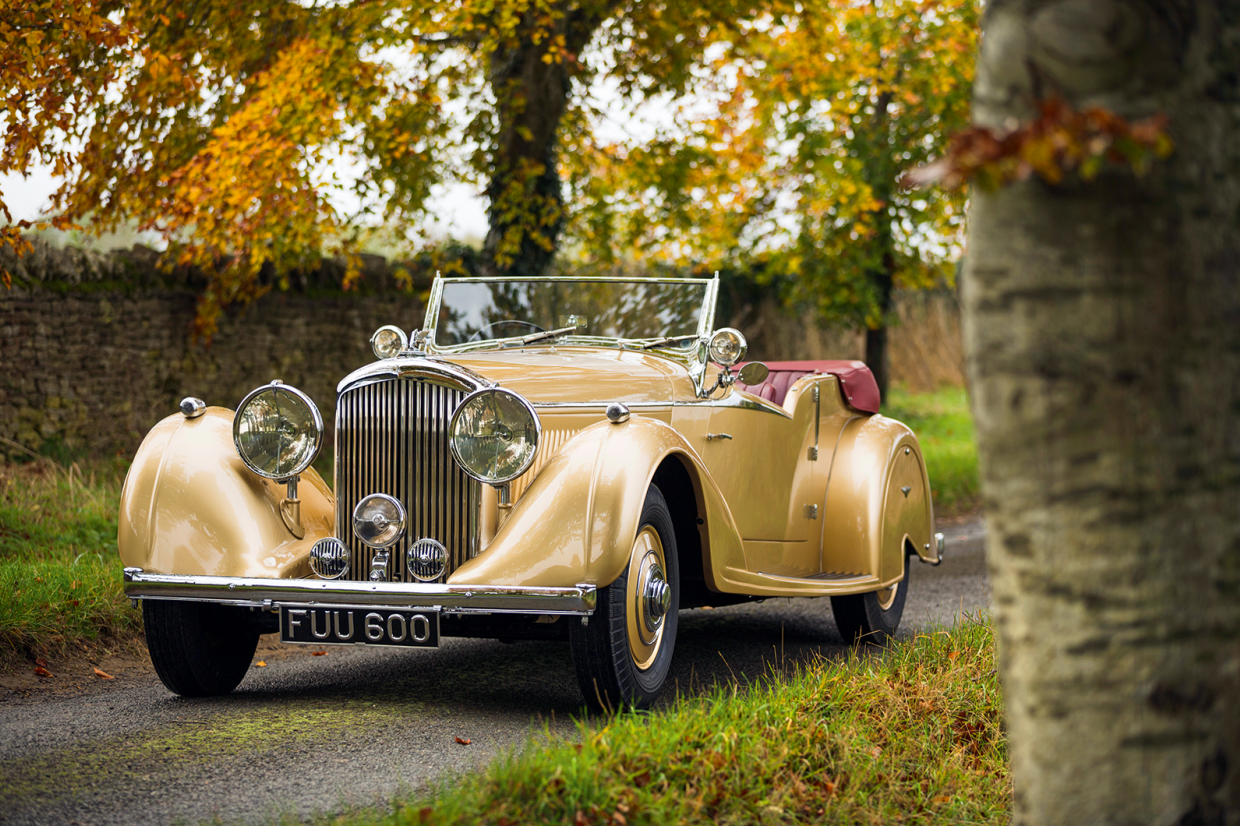 This luminous Bentley has lived a colourful life
This luminous Bentley has lived a colourful life
At standstill this famous Derby is eye-catching, but there’s nothing like seeing it in motion.
Wafting around the Cotswolds through the autumnal splendour, the scene looks like something straight out of the pre-war Bentley promotional magazine On the Road.
SRC: https://www.classicandsportscar.com/








